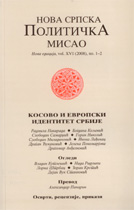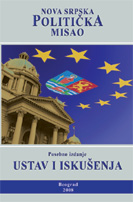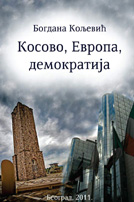| NSPM in English | |||
The Moscow Bombings |
 |
 |
 |
| sreda, 31. mart 2010. | |
|
(The National Interest, 29.3.2010)
First, Russia. When combined with a deadly November 2009 train bombing, the new attacks make clear that violent Chechen extremists aim to export their violent insurgency beyond the North Caucasus. They appear to prefer high-profile targets associated with components of Russia’s elite: the November attack derailed the Nevsky Express, a luxury express train between Moscow and St. Petersburg, and the latest explosions took place in metro stations serving the headquarters of the Federal Security Service and RIA-Novosti, the state press agency. The fact that the terrorists succeeded twice within six months suggests that Russia remains less stable and predictable than those outside the country often think. When combined with an economic beating inflicted by the global financial crisis and with growing, but still modest, public protests, Russia’s terrorism problem makes it difficult to cling to straight-line projections for the country’s political and economic future. When combined with the surprisingly poor performance of Russian athletes at the Vancouver Olympics, the attacks suggest that Russia may no longer live up to Cold War stereotypes many still hold; in other words, what is true for winter sports may well be true for the difficult work of gathering intelligence too and Russia is probably not quite the police state that many believe. With all of this in mind, the risk of a “non-linear event”—bland, bureaucratic language to describe something sudden and shocking that changes Russia’s course—appears to be increasing rather than decreasing. If Russians themselves come to believe this—and it seems that some already do—it could have important consequences for Russian politics, especially in the complex and delicate relationship between President Dmitri Medvedev and his not-so-subordinate subordinate, Prime Minister Vladimir Putin. Notwithstanding his methods, and some internal criticism, Putin received wide public credit in Russia for stabilizing the Caucasus and the country during his time as president. Whether the region was as stable as some believed, and whether giving a free hand to the ruthless and corrupt Ramzan Kadyrov was either effective in the long run or moral, Russians saw Putin as ending the war. In fact, in a strategic sense, some Russians see the attacks as a sign of the Chechen extremists’ weakness. From this perspective, the attacks are the last desperate acts of an insurgency that is suffering under increasingly effective Russian operations against their leadership and organizations and can no longer mount meaningful military operations in Chechnya. Nevertheless, whether the attacks reflect weakness or new capabilities, they will be a major test for Medvedev, something that in the eyes of many may determine whether he is a fit successor to Putin or, alternatively, whether Russia “needs” Putin to return to the presidency. The Medvedev-Putin dynamic can in turn shape U.S.-Russian relations, as the “reset” is much more Medvedev’s project than Putin’s, and will be interesting to watch in the coming days and weeks. Closer to home, the American reaction to terrorism in Russia will also shape the U.S.-Russian relationship—and this is one reason that President Obama’s statement on the attacks was important. It was an unambiguous denunciation of the attacks that did not in any way refer to “legitimate grievances,” “root causes,” or other justifications for violence against civilians. Some are naturally tempted to blame Moscow for the attacks because of its handling of Chechnya and the Caucasus, which has been extremely poor and, as President Medvedev himself has admitted, has contributed to corruption, lawlessness, unemployment and hopelessness. All of these factors make terrorism more likely, but blaming the attacks on Moscow is a mistake for three reasons. First, and most important, is the moral argument that the metro bombings deliberately targeted civilians and were designed to maximize casualties. There is no justification whatsoever for this kind of attack. Terrorism may be facilitated by problems like those in Chechnya, but it is caused by people who decide to kill civilians. Second, more practically, blaming the victim rather than the criminal will totally undermine any American efforts to work with Russia to combat terrorism, including in Afghanistan, where Russian intelligence information could save American lives and help the United States to stabilize the country. Without equating the scale of the attacks, Russians will remember who says what today, they way that Americans remember who said what on September 11 and 12, 2001. Finally, more broadly, one of the most important steps in choking off international terrorism is preventing terrorists from receiving support or tolerance from other states. At minimum, this requires that states universally condemn terrorism when it occurs rather than trying to balance sympathy for the victims against sympathy for the grievances of the Palestinians, the Basques, the IRA, or whomever else. Few people become terrorists without having grievances, some of which may even be legitimate. But however justifiable their complaints may be, their actions merit only disgust. Ultimately, perhaps the greatest significance of the Moscow attacks lies in the way that they challenge our assumptions. Hopefully, Americans and their leaders will review not only what they think they know about Russia and terrorism, but what they believe about our own vulnerabilities. Then we will be better prepared to avoid a subway or train bombing in Washington, New York, Chicago, or another major U.S. city. Paul J. Saunders is Executive Director of The Nixon Center. He served in the State Department from 2003 to 2005. |
Ostali članci u rubrici
- Playing With Fire in Ukraine
- Kosovo as a res extra commercium and the alchemy of colonization
- The Balkans XX years after NATO aggression: the case of the Republic of Srpska – past, present and future
- Iz arhive - Remarks Before the Foreign Affairs Committee of the European Parliament
- Dysfunction in the Balkans - Can the Post-Yugoslav Settlement Survive?
- Serbia’s latest would-be savior is a modernizer, a strongman - or both
- Why the Ukraine Crisis Is the West’s Fault
- The Ghosts of World War I Circle over Ukraine
- Nato's action plan in Ukraine is right out of Dr Strangelove
- Why Yanukovych Said No to Europe

.jpg)








.jpg) President Barack Obama was right to issue a rapid condemnation of the Moscow metro bombings, extend sympathy to the victims, and express American solidarity “in opposition to violent extremism and heinous terrorist attacks.” When terrorists kill civilians, it is the only appropriate response. Nevertheless, as time passes, Americans would also do well to reflect on the implications of the attacks for Russia, U.S.-Russian relations and American foreign policy.
President Barack Obama was right to issue a rapid condemnation of the Moscow metro bombings, extend sympathy to the victims, and express American solidarity “in opposition to violent extremism and heinous terrorist attacks.” When terrorists kill civilians, it is the only appropriate response. Nevertheless, as time passes, Americans would also do well to reflect on the implications of the attacks for Russia, U.S.-Russian relations and American foreign policy.













